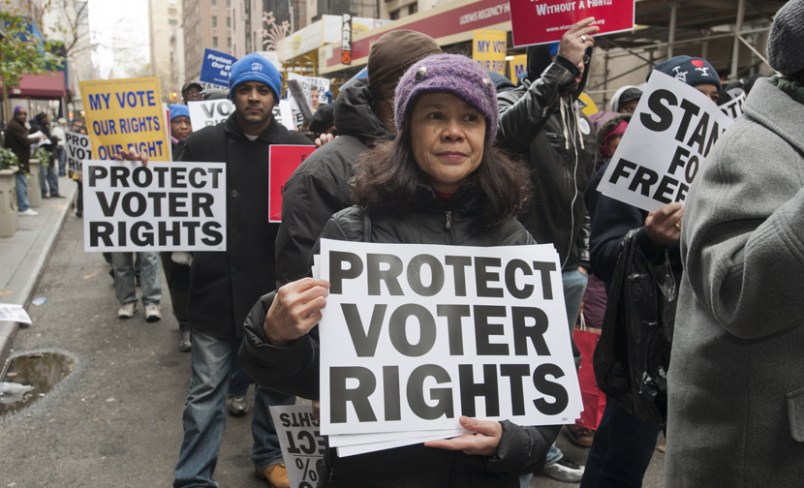Updated: Dec. 23, 2011, 5:28PM
The U.S. Department of Justice will block the voter ID provisions of an election law passed in South Carolina earlier this year because the state’s own statistics demonstrated that the photo identification requirement would have a much greater impact on non-white residents, DOJ said in a letter to the state on Friday.
The decision places the federal government squarely in opposition to the types of voter ID requirements that have swept through mostly Republican-controlled state legislatures.
Officials in DOJ’s Civil Rights Division found a significant racial disparity in the data provided by South Carolina, which must have changes to its election laws precleared under Section 5 of the Voting Rights Act, because of past history of discrimination. The data demonstrated that registered non-white voters were 20 percent more likely than white voters to lack the specific type of photo identification required to exercise their constitutional rights, according to a letter sent to South Carolina and obtained by TPM.
“Put differently, although non-white voters comprised 30.4% of the state’s registered voters, they constituted 34.2% of registered voters who did not have the requisite DMV-issued identification to vote,” Assistant Attorney General Thomas E. Perez, who heads the Civil Rights Division, wrote in the letter to South Carolina. “Non-white voters were therefore disproportionally represented, to a significant degree, in the group of registered voters who, under the proposed law, would be rendered ineligible to go to the polls and participate in the election.”
Perez wrote that the number of minority citizens whose exercise of the francise could be adversely affected by the proposed requirements “runs in the tens of thousands.” He wrote that the state had “failed entirely to address the disparity between the proportions of white and non-white registered voters who lack DMV-issued identification.”
Because Justice Department lawyers reached the conclusion that South Carolina’s voter ID law would have the effect of suppressing minority voter turnout, they found it was unnecessary to examine whether that was the intent of the legislators who voted for the law. Cases based on intent to discriminate are usually more difficult to prove even though they don’t require the government to prove the effect was discriminatory.
South Carolina Gov. Nikki Haley (R) signed the bill into law in May and even offered voters free rides to the DMV to obtain the photo ID required to cast a ballot. It also got the backing of Sen. Lindsey Graham (R) who called voter ID laws the “future of the country” while calling on Congress to pass a federal voter ID law.
The Justice Department’s decision will undoubtably have huge political ramifications. Its decision will come as good news to Democrats and voting rights advocates like the Brennan Center’s Keesha Gaskins, who wrote in a blog post that having DOJ deny “preclearance for South Carolina’s discriminatory voter ID law” was all she wanted for Christmas. Despite Attorney General Eric Holder’s speech encouraging Americans to find ways to expand access to the polls, civil rights leaders say DOJ hasn’t done enough to stop laws which would do just the opposite. They are still pushing DOJ to pursue action against other states with voter ID laws not covered under Section 5.
For the mostly conservative backers of voter ID measures, it’ll be a different story. Supporters of voter ID laws — like those who write editorials for the Wall Street Journal — have argued that DOJ should approve the law because the Department cleared Georgia’s voter ID law in 2005. What they leave out is that officials in the Bush administration approved the law over the objections of career staffers in the Voting Section who believed Georgia’s law was discriminatory. (The Justice Department Inspector General found that Bradley Schlozman had politicized the Voting Section during the Bush administration, while an Obama-Biden transition team report found that the “politicization of legal analyses and case decisions at the expense of sound law enforcement” in the Voting Section during the Bush administration was “particularly egregious.”)
DOJ’s announcement came on Friday afternoon because they were required to respond to South Carolina by Tuesday of next week and Monday is a federal holiday. It marked the third time the Justice Department weighed in on a voter ID law: officials previously blocked a voter ID law in Louisiana in 1994.
So what’s next? That’s up to South Carolina. If the state does nothing, the voter ID provisions of the law are kaput. Alternatively, they can provide new data (they told DOJ 55 days into the 60 day review period that the data they originally turned over was flawed) and ask for reconsideration, pass a new and different law (perhaps with less stringent identification requirements) or they can sue and try their luck in court. The Supreme Court upheld Indiana’s voter ID law in 2008, so South Carolina might like its chances, though the question of racial disparity wasn’t the focus of the court’s decision.
Justice Department Letter To South Carolina Blocking Voter ID Law






